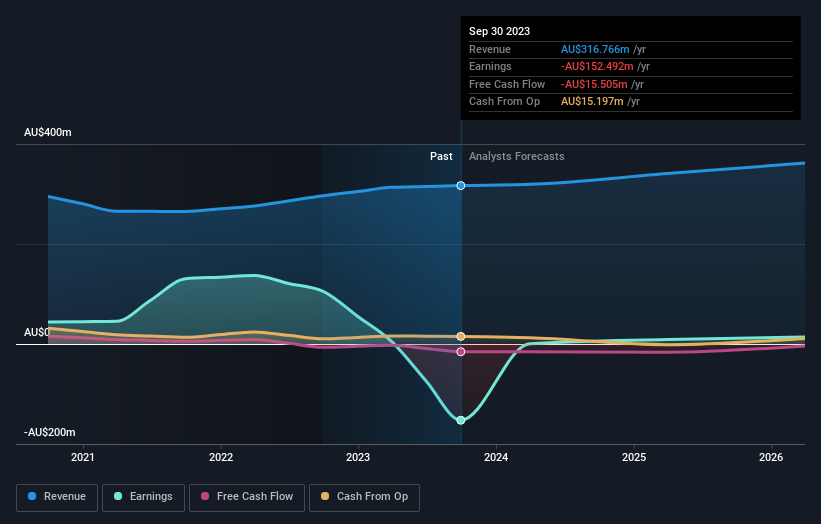With 73% ownership, Australian Agricultural Company Limited (ASX:AAC) insiders have a lot at stake
Key Insights
Significant insider control over Australian Agricultural implies vested interests in company growth
52% of the company is held by a single shareholder (Bryan Glinton)
Past performance of a company along with ownership data serve to give a strong idea about prospects for a business
A look at the shareholders of Australian Agricultural Company Limited (ASX:AAC) can tell us which group is most powerful. And the group that holds the biggest piece of the pie are individual insiders with 73% ownership. Put another way, the group faces the maximum upside potential (or downside risk).
So, insiders of Australian Agricultural have a lot at stake and every decision they make on the company’s future is important to them from a financial point of view.
Let's take a closer look to see what the different types of shareholders can tell us about Australian Agricultural.
Check out our latest analysis for Australian Agricultural
What Does The Institutional Ownership Tell Us About Australian Agricultural?
Many institutions measure their performance against an index that approximates the local market. So they usually pay more attention to companies that are included in major indices.
As you can see, institutional investors have a fair amount of stake in Australian Agricultural. This can indicate that the company has a certain degree of credibility in the investment community. However, it is best to be wary of relying on the supposed validation that comes with institutional investors. They too, get it wrong sometimes. When multiple institutions own a stock, there's always a risk that they are in a 'crowded trade'. When such a trade goes wrong, multiple parties may compete to sell stock fast. This risk is higher in a company without a history of growth. You can see Australian Agricultural's historic earnings and revenue below, but keep in mind there's always more to the story.
We note that hedge funds don't have a meaningful investment in Australian Agricultural. Our data shows that Bryan Glinton is the largest shareholder with 52% of shares outstanding. This implies that they have majority interest control of the future of the company. John Andrew Forrest is the second largest shareholder owning 19% of common stock, and The Vanguard Group, Inc. holds about 2.0% of the company stock.
While studying institutional ownership for a company can add value to your research, it is also a good practice to research analyst recommendations to get a deeper understand of a stock's expected performance. There is a little analyst coverage of the stock, but not much. So there is room for it to gain more coverage.
Insider Ownership Of Australian Agricultural
While the precise definition of an insider can be subjective, almost everyone considers board members to be insiders. The company management answer to the board and the latter should represent the interests of shareholders. Notably, sometimes top-level managers are on the board themselves.
I generally consider insider ownership to be a good thing. However, on some occasions it makes it more difficult for other shareholders to hold the board accountable for decisions.
Our most recent data indicates that insiders own the majority of Australian Agricultural Company Limited. This means they can collectively make decisions for the company. Given it has a market cap of AU$829m, that means they have AU$604m worth of shares. Most would argue this is a positive, showing strong alignment with shareholders. You can click here to see if those insiders have been buying or selling.
General Public Ownership
The general public, who are usually individual investors, hold a 21% stake in Australian Agricultural. While this group can't necessarily call the shots, it can certainly have a real influence on how the company is run.
Next Steps:
It's always worth thinking about the different groups who own shares in a company. But to understand Australian Agricultural better, we need to consider many other factors.
I like to dive deeper into how a company has performed in the past. You can find historic revenue and earnings in this detailed graph.
If you would prefer discover what analysts are predicting in terms of future growth, do not miss this free report on analyst forecasts.
NB: Figures in this article are calculated using data from the last twelve months, which refer to the 12-month period ending on the last date of the month the financial statement is dated. This may not be consistent with full year annual report figures.
Have feedback on this article? Concerned about the content? Get in touch with us directly. Alternatively, email editorial-team (at) simplywallst.com.
This article by Simply Wall St is general in nature. We provide commentary based on historical data and analyst forecasts only using an unbiased methodology and our articles are not intended to be financial advice. It does not constitute a recommendation to buy or sell any stock, and does not take account of your objectives, or your financial situation. We aim to bring you long-term focused analysis driven by fundamental data. Note that our analysis may not factor in the latest price-sensitive company announcements or qualitative material. Simply Wall St has no position in any stocks mentioned.

 Yahoo Finance
Yahoo Finance 

